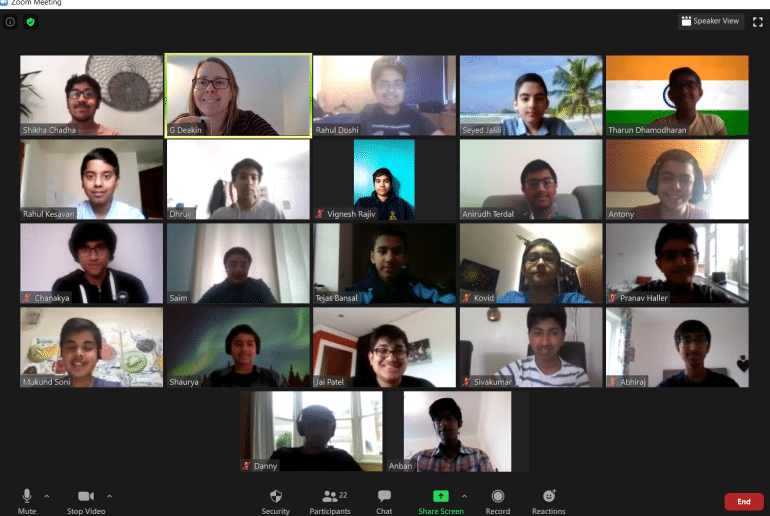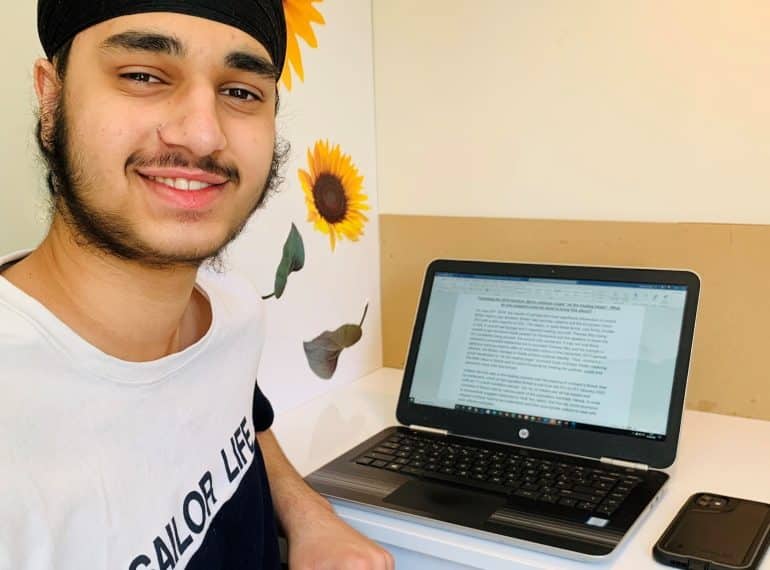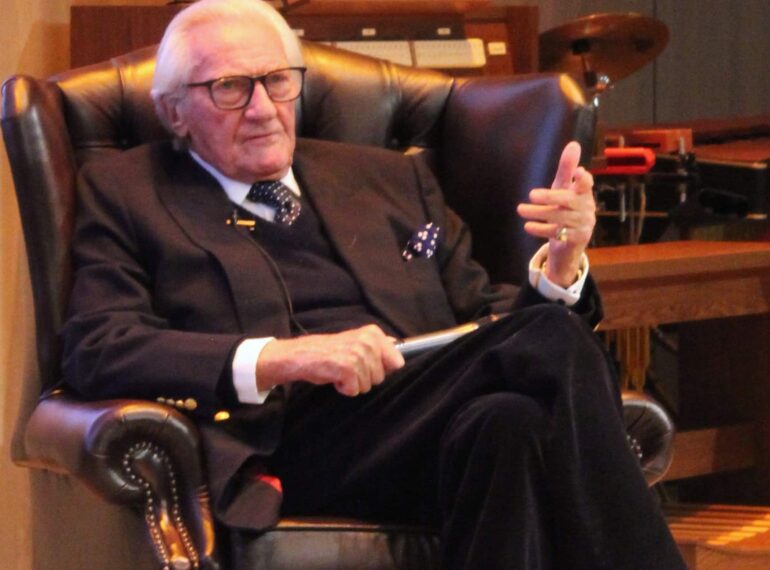
Former Deputy Prime Minister Lord Michael Heseltine delivered a lunchtime lecture giving an insider’s view of the key characters and issues that have shaped modern British politics.
 The Conservative politician, who worked directly with four Prime Ministers, spoke to a packed house drawn from all year groups in the Friends’ Recital Hall. The optional lecture, part of QE’s Flourish extra-curricular programme, was organised by Year 13 pupil Anish Kumar and the QE Politics Society.
The Conservative politician, who worked directly with four Prime Ministers, spoke to a packed house drawn from all year groups in the Friends’ Recital Hall. The optional lecture, part of QE’s Flourish extra-curricular programme, was organised by Year 13 pupil Anish Kumar and the QE Politics Society.
Headmaster Neil Enright said: “We are keen for the boys to hear from leaders and influential thinkers in their respective fields. Lord Heseltine is a towering figure in British politics: it was an honour to welcome him to the School and we are most grateful to him for taking the time to visit and deliver such an insightful lecture drawn from a political career spanning some 50 years.”
Mr Enright thanked Anish and the Politics Society for organising the visit and paid tribute to all who had worked to ensure it passed off smoothly.
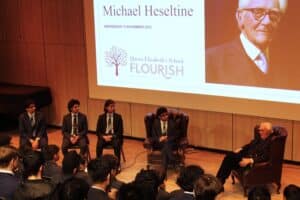 Lord Heseltine, who is 90, began his career as a property developer, before becoming one of the founders of the Haymarket publishing house. He served as a Conservative Member of Parliament from 1966 to 2001, when he was created a life peer.
Lord Heseltine, who is 90, began his career as a property developer, before becoming one of the founders of the Haymarket publishing house. He served as a Conservative Member of Parliament from 1966 to 2001, when he was created a life peer.
Having previously served Ted Heath, he entered the Cabinet in 1979 under Margaret Thatcher as Secretary of State for the Environment. He served as Deputy Prime Minister and First Secretary of State within John Major’s administration. Later, he fulfilled advisory roles when David Cameron was Prime Minister.
Lord Heseltine began his lecture after a welcome from Anish – who introduced him as “one of [his] political heroes” – and warm applause from the boys.
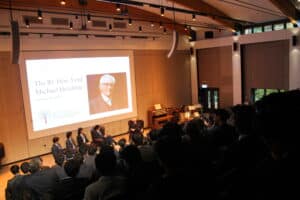 In his lecture, he covered topics ranging from industrial strategy (a particular interest and area of expertise of his) and the revitalisation of the city of Liverpool (with which he has a special, and perhaps unique, relationship as a Conservative politician), to devolution. Famously a supporter of the European Union and opponent of Eurosceptics, he expressed his desire to see the UK return to the EU fold in the future.
In his lecture, he covered topics ranging from industrial strategy (a particular interest and area of expertise of his) and the revitalisation of the city of Liverpool (with which he has a special, and perhaps unique, relationship as a Conservative politician), to devolution. Famously a supporter of the European Union and opponent of Eurosceptics, he expressed his desire to see the UK return to the EU fold in the future.
In a Q & A session chaired by Anish, pupils then posed their own questions.
- On the future of the Conservative Party, he opined that it will find power from the centre-ground – an answer that was especially topical, given the recent Government reshuffle and the return to government of David, now Lord, Cameron;
- On the nature of a life in politics, Lord Heseltine said it was a privilege, but one that inescapably involved making unpopular decisions, often on “50:50” issues in which the side you support will think you reasonable and “a good, sensible bloke”, while those whose expectations are dashed will believe you don’t listen, don’t care and are in politics only for yourself!
- When asked about his proudest moment, he referenced his 1981 party conference speech;
- On whether he regrets not quite becoming Prime Minister, he answered in the affirmative and furthermore set out the approach he would take to transform the nation’s governance and economic strategy if he were in 10 Downing Street today.

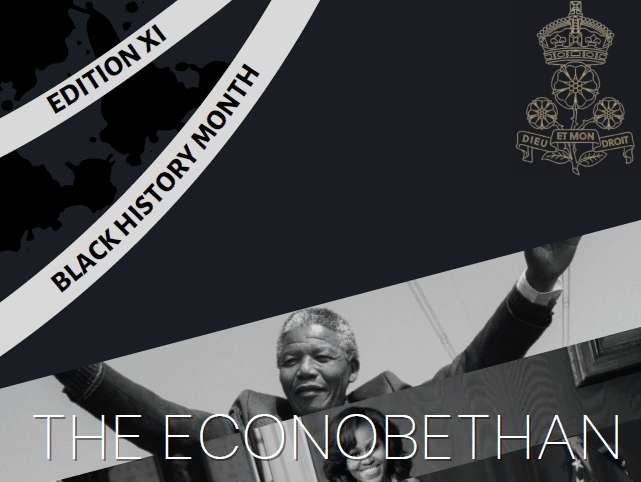
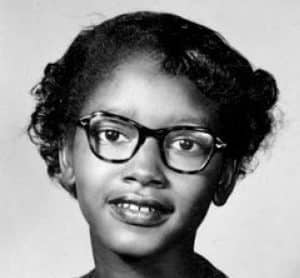 “The theme of Black history is timely: through the launch of our long-term vision for a broad, diverse and inclusive curriculum, we seek to build on the very thoughtful work that has already been done at the School, ensuring that our pupils are well-equipped to thrive in our diverse, modern world.”
“The theme of Black history is timely: through the launch of our long-term vision for a broad, diverse and inclusive curriculum, we seek to build on the very thoughtful work that has already been done at the School, ensuring that our pupils are well-equipped to thrive in our diverse, modern world.”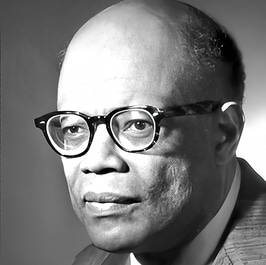 Aston Daniel looks in more detail at the work of Sir Arthur, while a piece from Avinash is entitled How Does Systemic Racism Continue to Impact Economic Outcomes for African Americans? and Keith Correia writes on How was the war on drugs in the US used as a segregation tool?
Aston Daniel looks in more detail at the work of Sir Arthur, while a piece from Avinash is entitled How Does Systemic Racism Continue to Impact Economic Outcomes for African Americans? and Keith Correia writes on How was the war on drugs in the US used as a segregation tool?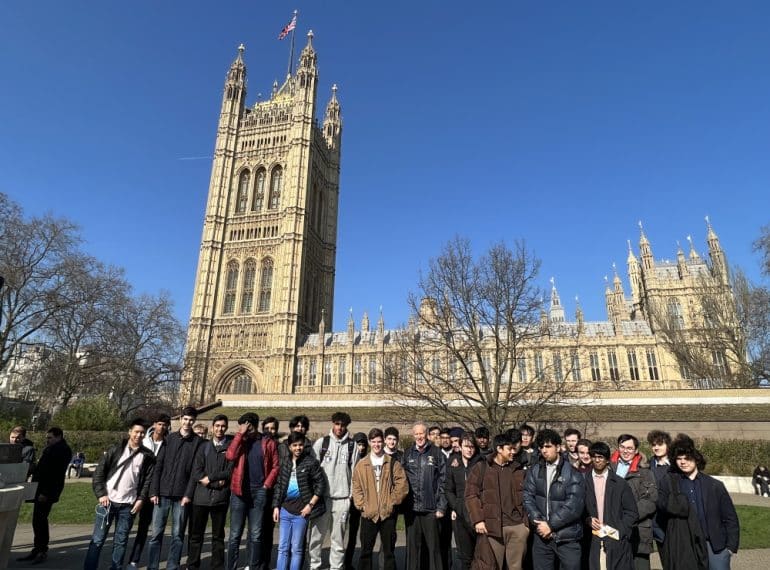
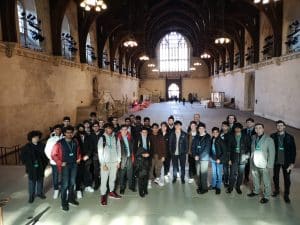 The 28 A-level students on a visit to Westminster watched as Foreign Secretary Liz Truss answered questions from MPs and described measures the Government was taking to help Ukraine. Shadow Foreign Secretary David Lammy responded for the Opposition, questioning whether enough was being done.
The 28 A-level students on a visit to Westminster watched as Foreign Secretary Liz Truss answered questions from MPs and described measures the Government was taking to help Ukraine. Shadow Foreign Secretary David Lammy responded for the Opposition, questioning whether enough was being done.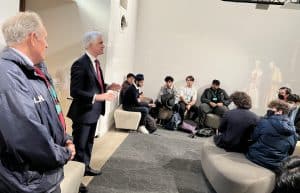 During their visit, the boys met Old Elizabethan James Cartlidge MP (OE 1985-1992), a junior minister in the Justice Department. He shared his fond memories of being an independent candidate in QE’s 1992 mock General Election and of hearing from visiting speakers from the political world while at the School.
During their visit, the boys met Old Elizabethan James Cartlidge MP (OE 1985-1992), a junior minister in the Justice Department. He shared his fond memories of being an independent candidate in QE’s 1992 mock General Election and of hearing from visiting speakers from the political world while at the School.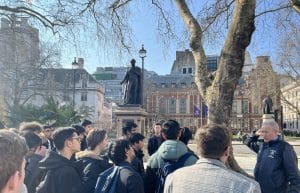 The boys were accompanied not only by their teachers, but also by the three student teachers – Evan Burns, Nathaniel Austin-Mathley, and Ben Duncan – who are with QE this year as part of the long-established internship programme with the University of Connecticut.
The boys were accompanied not only by their teachers, but also by the three student teachers – Evan Burns, Nathaniel Austin-Mathley, and Ben Duncan – who are with QE this year as part of the long-established internship programme with the University of Connecticut.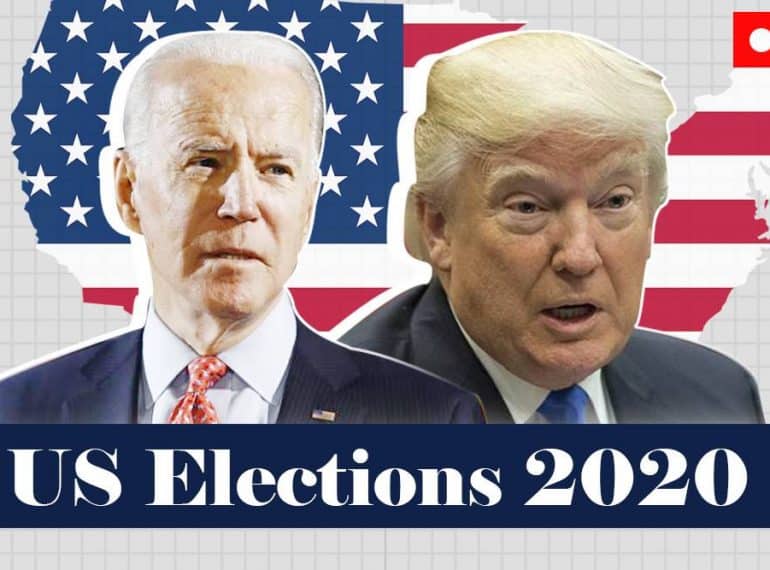
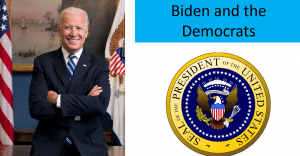 Boys voted in their forms yesterday on their first day back after the holiday, having spent the weeks before half-term finding out more about the two main presidential candidates and the whole American electoral process.
Boys voted in their forms yesterday on their first day back after the holiday, having spent the weeks before half-term finding out more about the two main presidential candidates and the whole American electoral process.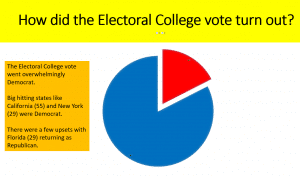 The popular vote was also emphatic: there were 821 votes for the Democrats, compared with just 322 for the Republicans. Of the six year groups voting, only Year 10 voted red (Republican), while Biden swept the board in Year 7.
The popular vote was also emphatic: there were 821 votes for the Democrats, compared with just 322 for the Republicans. Of the six year groups voting, only Year 10 voted red (Republican), while Biden swept the board in Year 7.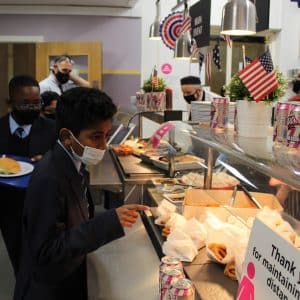 In order to make the experience as realistic as possible, every tutor group was allocated a state. Each had the same number of votes as in the electoral college, ranging from Alaska, Wyoming, Delaware, the District of Columbia, Montana, North Dakota, South Dakota and Vermont, all with just three votes apiece, through to Texas, with 38, and California, with its 55.
In order to make the experience as realistic as possible, every tutor group was allocated a state. Each had the same number of votes as in the electoral college, ranging from Alaska, Wyoming, Delaware, the District of Columbia, Montana, North Dakota, South Dakota and Vermont, all with just three votes apiece, through to Texas, with 38, and California, with its 55.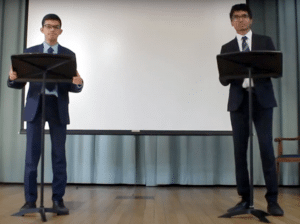 Information and links on the eQE election page included:
Information and links on the eQE election page included: